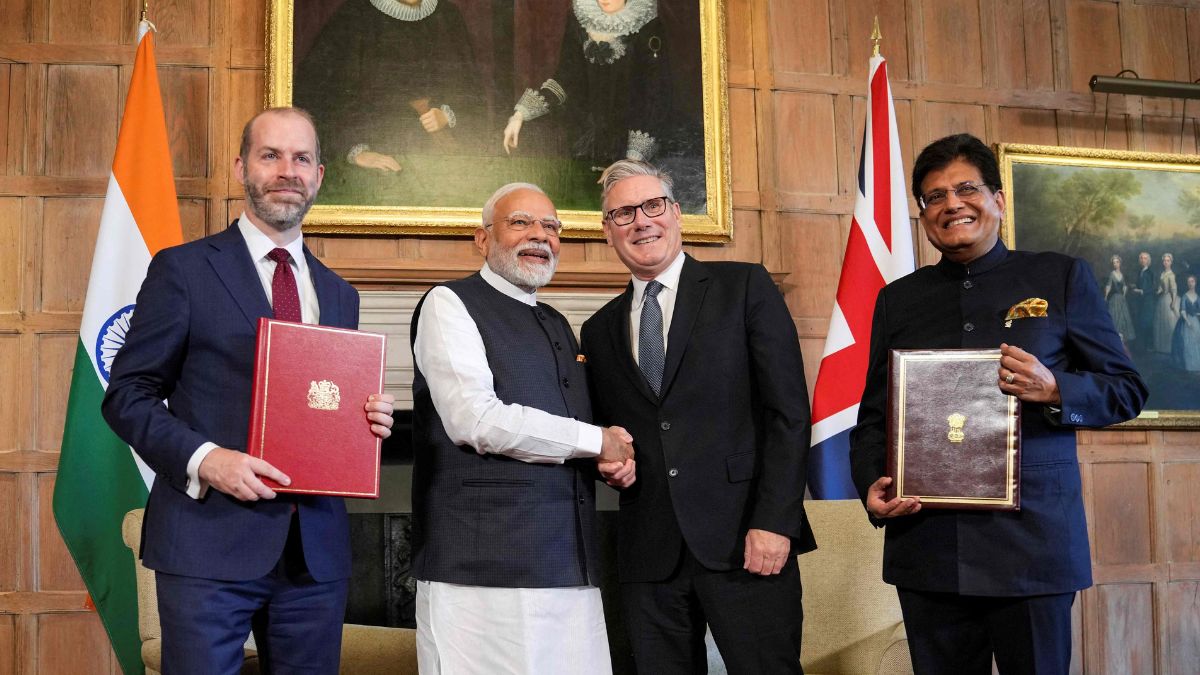India-UK FTA unfair to local businesses? Centre clarifies controversial clause in government procurement
 British PM Keir Starmer (centre right) and India PM Narendra Modi (centre left) shake hands next to UK Business Secretary Jonathan Reynolds (left) and Union Minister of Industries Piyush Goyal (right) holding the Free Trade Agreement on July 24 2025 | AFP
British PM Keir Starmer (centre right) and India PM Narendra Modi (centre left) shake hands next to UK Business Secretary Jonathan Reynolds (left) and Union Minister of Industries Piyush Goyal (right) holding the Free Trade Agreement on July 24 2025 | AFP
India has rushed to allay concerns over the opening up of government procurement (GP) to British firms under the free trade agreement (FTA) signed in the presence of PM Modi and British premier Starmer in London on Thursday.
Since the announcement of a deal in May and the formal signing this week, several quarters have expressed worries that this will put many small Indian businesses at a disadvantage.
However, government sources sought to play it down, pointing out how a level-playing field will be maintained, and if at all, the agreement provides for an asymmetric threshold, which will be of advantage to India.
This means that while an Indian supplier bidding for a procurement contract from the UK government can bid for anything above a value set at approximately 1.6 crore rupees, for a British firm applying for the same in India, the threshold will be higher at ₹5.5 crore.
However, for procurement related to construction services, both sides have agreed to have a similar threshold of ₹60 crore.
There is also agreement on the preferential treatment of Indian suppliers, who continue to be slotted under ‘Class-I local suppliers’, provided their goods or services have more than 50 per cent local content from India. Those from Britain will be eligible only for the ‘Class-II local suppliers’ category.
The commerce industry has been particularly at pains to clarify that this provision will not hamper the prospects of small businesses, traders and contractors who will now have to face better-placed foreign competitors in this space.
Back in May, after the deal was announced, the policy think-tank GTRI had said that allowing UK firms to participate in GP tenders could crowd out MSMEs, which rely heavily on protected access to such contracts.
‘India has also preserved its policy space to provide preference to MSMEs under the Public Procurement Policy for Micro and Small Enterprises Order (MSE Order)’, a note released Thursday night emphasised.
Govt also makes it clear that the opening of tenders to British firms applies only to central government ministries and departments, and excludes PSUs as well as state and local governments.
In turn, Indian firms will have the opportunity to try for tenders in British government entities, including the Cabinet Office, NHS, National Highways, etc.
Ironically, India’s February 2022 free trade agreement with the United Arab Emirates (UAE) also has provisions for giving access to GP tenders. However, this comes with higher thresholds and limitations, including the exclusion of sensitive sectors like agriculture, health and MSME procurement.
Business